Extended Perception (IMA NYU, Spring 2020)
Description
Utilizing artistic, technological, and scientific ground-breaking studies, the class introduces students to the topic of Enhanced/Extended Perception. Through the analysis of selected theoretical and practical examples, students are challenged to reconsider and re-evaluate the biological sensory and perceptual apparatus by creating their own disruptive designs. The course consists of lectures (⅓), workshops (⅓), and practical sessions (⅓), and intends to provide a comprehensive and critical understanding both on the theory and philosophy related to the mind, perception, and reality, as well as on the development of functional (art and technology) prototypes that demonstrate how perception is extended, enhanced, or even hacked.
The course Extended Perception introduces students to theoretical and practical studies on technological augmentation and how they can alter, extend, and enhance biological senses, perception, and consciousness. Upon completion of this course, students will be able to:
- Have a comprehensive understanding of how contemporary media and technologies are utilized to amplify and extend senses and perception.
- Recognize relevant state-of-the-art artistic and scientific practices and utilize this knowledge to individual creative works.
- Demonstrate technical skills in a range of cutting-edge software and hardware tools and resources.
- Apply critical skills through reflection on theoretical and philosophical content, which is accomplished from class debates and related activities.
Assignments
Students are encouraged to participate in class through theoretical and practical activities, discussions, debates, and studio sessions. There are 3 main practical assignments for this course:
- Assignment 1 – Augmented: Students are expected to develop a physical prototype that includes a sensing system with a feedback mechanism. The prototype can be in the form of a wearable, and it needs to be presented in class as fully designed and functional.
- Assignment 2 – Connected: For the needs of Assignment 2, students need to develop and present a system that utilizes communication networks with interconnected agents in order to enhance perception and senses within a particular context based either on scientific, artistic, or philosophical research.
- Assignment 3 – Transcended: Utilize a fully working software and/or hardware prototype that demonstrates a scenario for amplified/extrasensory cognition/sensing/perception. The project will consist of independent study that is guided and supported by the instructor.
Syllabus (in brief)

- Lecture (1h)
Introduction, Learning Objectives
Main and Supplementary Senses
Defining Sensation, Perception, Consciousness
Short Screening: “The Brain” (BBC)
Hacks of Perception
Relevant Artists & Practice (James Turrell, Aristotle, Kleinberger et al. – Phox Ears, Rebecca Horn, Susanna Hertrich, Beta Tank)
Summary & Conclusion - Workshop (1h) – Sensing & Reactivity (Arduino, assorted sensors)
- Practical (1h)

- Lecture (1h)
Introduction, Learning Objectives
Autopoiesis & Cognition
Defining Umwelt (Jakob von Uexküll)
Maturana & Varela – Cognitive Systems
Merleau-Ponty, Heidegger, Ihde (on Perception)
Screening: David Eagleman – New Senses for Humans (20 min)
Relevant Artists & Practice (Francis Bacon, Hyungkoo Lee, Castellanos & Valverde, Gerson Dublon, Anthony Hall, Carsten Holler)
Discussion: Should we challenge ourselves to extend our Unwelten?
Summary & Conclusion - Workshop (1h) – Physical Computing & Node.js (Arduino, Node.js, assorted sensors)
- Class Practical (1h)

- Lecture (1h)
Introduction, Learning Objectives
Defining Augmentation
Cyborgs, Robots, Humanoids
Donna Haraway’s Post-Humanism
Prosthetics
Relevant Artists & Practice (Stelarc, Troika, Eidos, Dis-Armor Project, Ikeuchi Hiroto)
New Bionics (Hugh Herr)
Discussion: Debating on technological augmentation
Summary & Conclusion - Workshop (1h) – Feedback Mechanisms (Arduino, assorted feedback systems)
- Class Practical (1h)

- Lecture (1h)
Introduction, Learning Objectives
Hypertext, Hypermedia, Cyberspace
Defining Telematics
La Plissure Du Texte & Distributed Authorship
Collective Intelligence (Pierre Levy)
Relevant Artists & Practice (La Plissure Du Texte 2&3, Telematic Dreaming, See you in Walhalla)
Defining Cyberception
Short Screenings: Matrix (immersion), True Skin (connectivity)
The Multiple Self (Ascott)
Summary & Conclusion - Workshop (1h) – Connected Systems & Distributed Authorship (Node.js, MQTT)
- Class Practical (1h)
Session 5: Presentations – AUGMENTED
- Submission & Presentation of Assignment 1 (physical design, electronics, sensing + documentation)

- Lecture (1h)
Introduction, Learning Objectives
Definitions: WetWare & MoistMedia
Merging Computational & Biological Systems / Organisms / Intelligence
Biohacking, Grinding, and Body Modification
Brain Implantation
Computational Processing as Brain (neural networks, genetic algorithms)
Neuroimaging (EEG, PET, MRI, and fMRI)
Uploading
Consciousness & Machines – Imitation Game and the Turing Machine
Relevant Artists & Practice (Gilberto Esparza, cellF, James Auger, Stelarc, Neil Harbisson’s Eyeborg)
Summary & Conclusion - Workshop (1h) – Cognitive Computing (Node.js, Node-Red, IBM-Watson)
- Class Practical (1h)

- Lecture (1h)
Introduction, Learning Objectives
Definitions
Chemical Activation – Neurochemistry & neurobiology
Collective Intelligence, Biological Enhancements
Synthetic Drugs, Cognition & Intelligence Amplification
The Hedonistic Imperative & Doors of Perception
Psychotropics & Virtuality – Validated, Vegetal & Virtual Realities
Genetic Engineering & DNA Dreams – Fluorescent Bunnies, Pop Music Genome Editing
Summary & Conclusions - Workshop (1h) – Front-End Space
- Class Practical (1h)
Session 8: Practical Session
- Practicals, Tutorials, Studio Development – Assignment 2
Session 9: Presentations – CONNECTED
- Submission & Presentation of Assignment 2 (telematics, electronics, physical prototypes + documentation)
Session 10: Practical Session
- Practicals / Tutorials
Session 11: Project 3 Briefing & Practical Session
Session 12: Practicals
Session 13: Practicals
Session 14: Presentations – TRANSCENDED
Students’ Outcomes
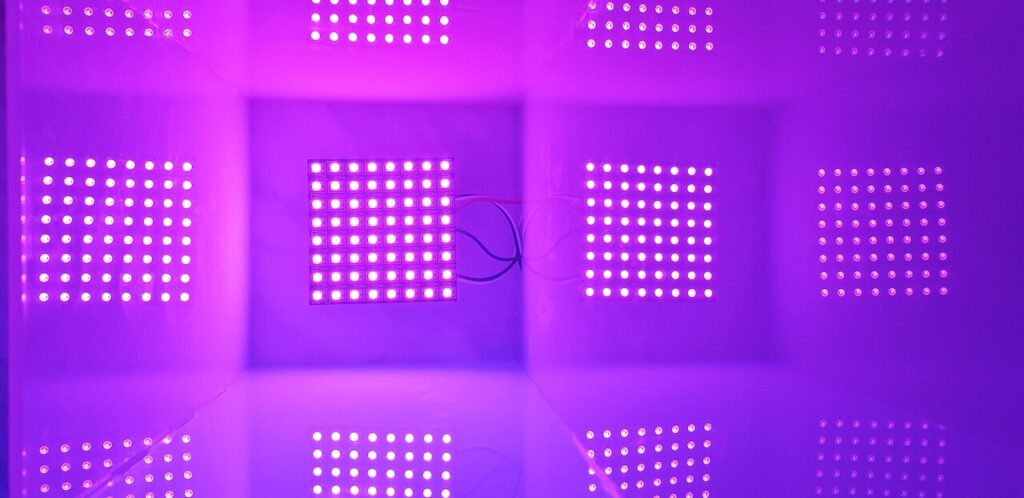
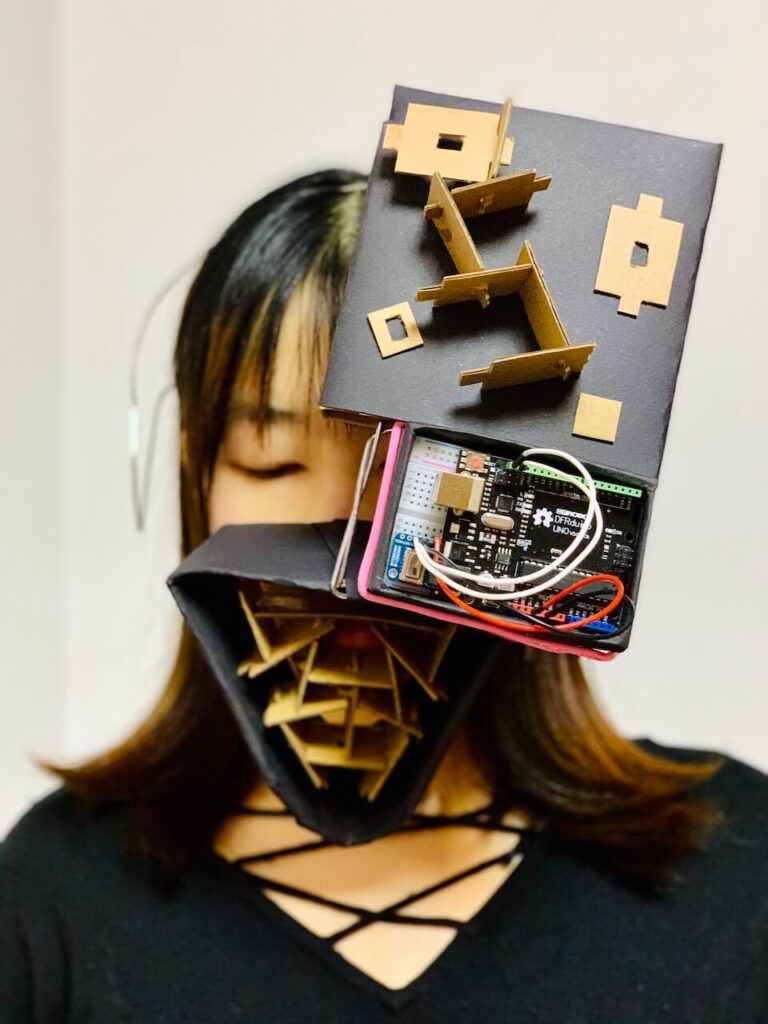
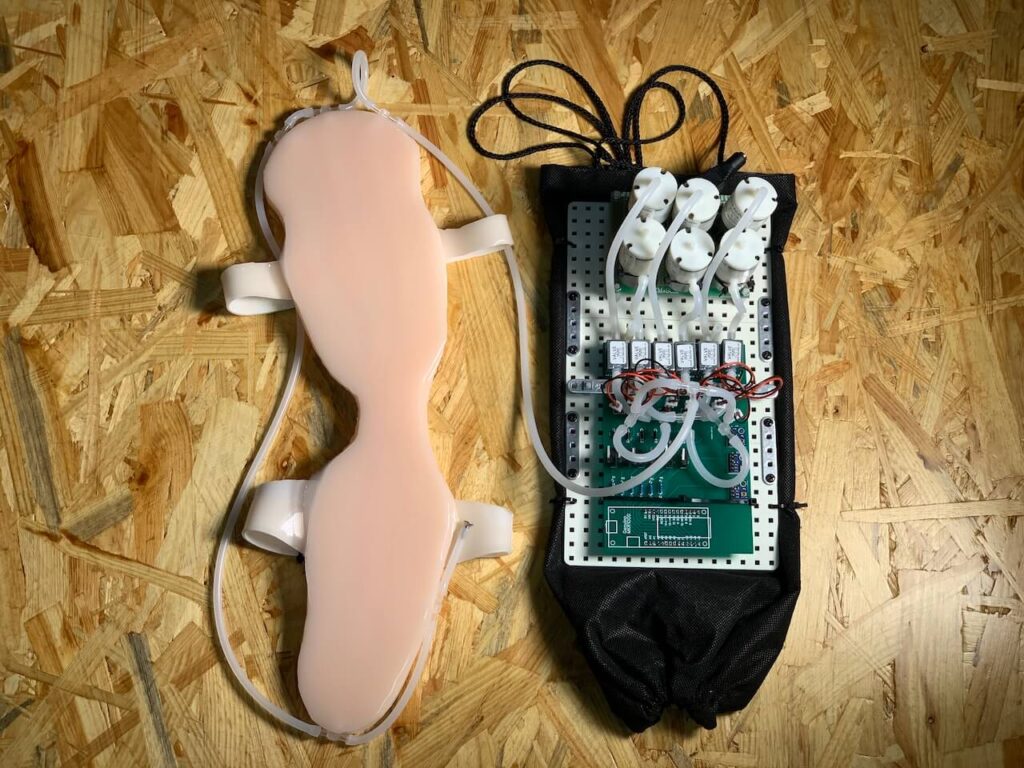
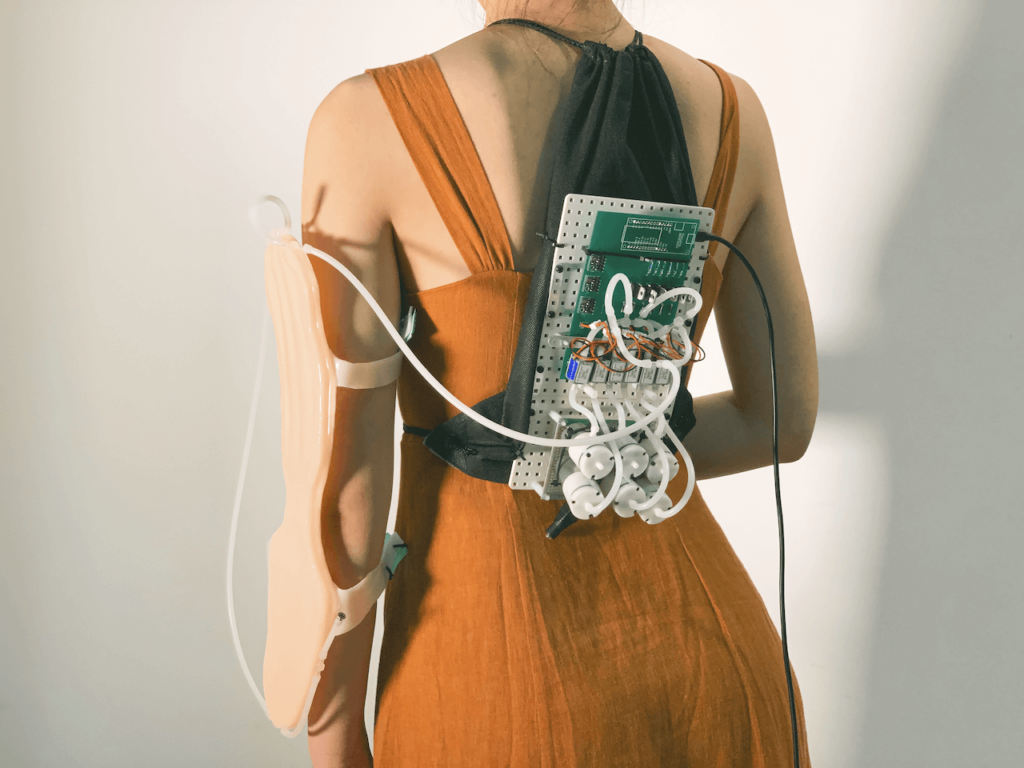
Guest Talks
Madeline Schwartzman (Parsons School of Design) – See Yourself Sensing (guest talk: video recording available here).
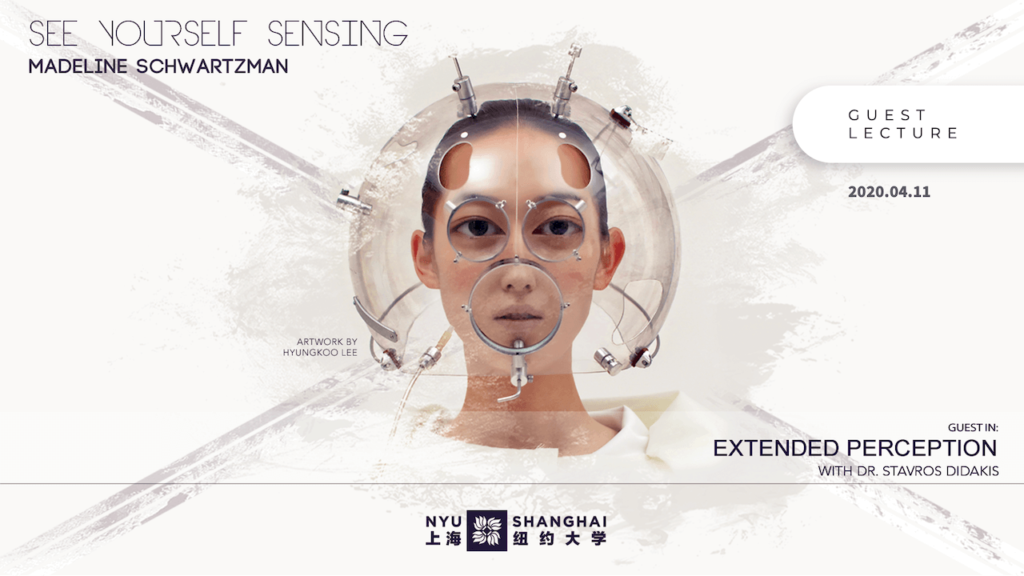
Gershon Dublon (MIT Media Lab) – Extrasensory Perception (guest talk: video recording available here).
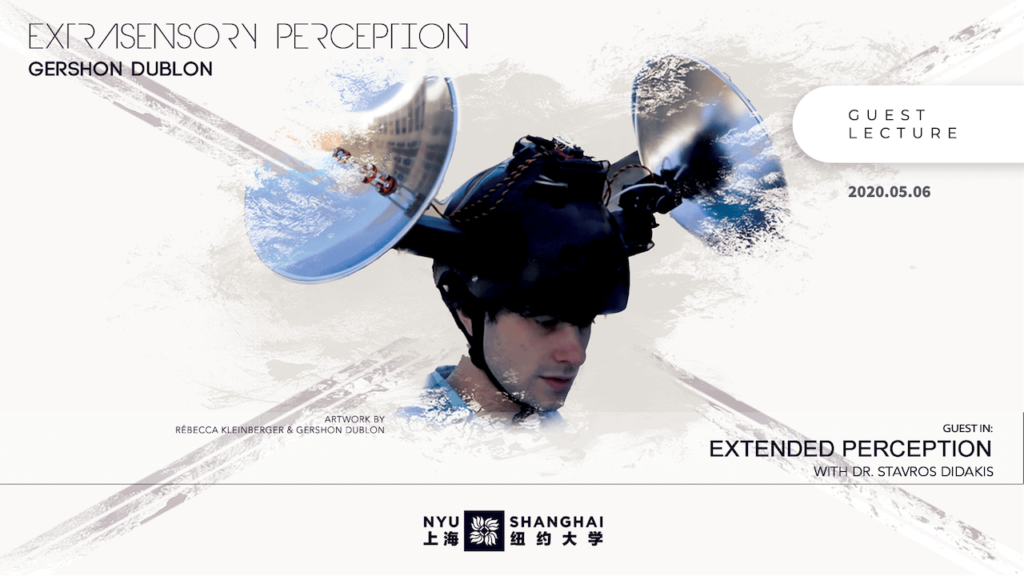
Jo Wei (Central Academy of Fine Arts, Beijing) – Human Engineering & Bio-Art (guest talk: video recording available here).
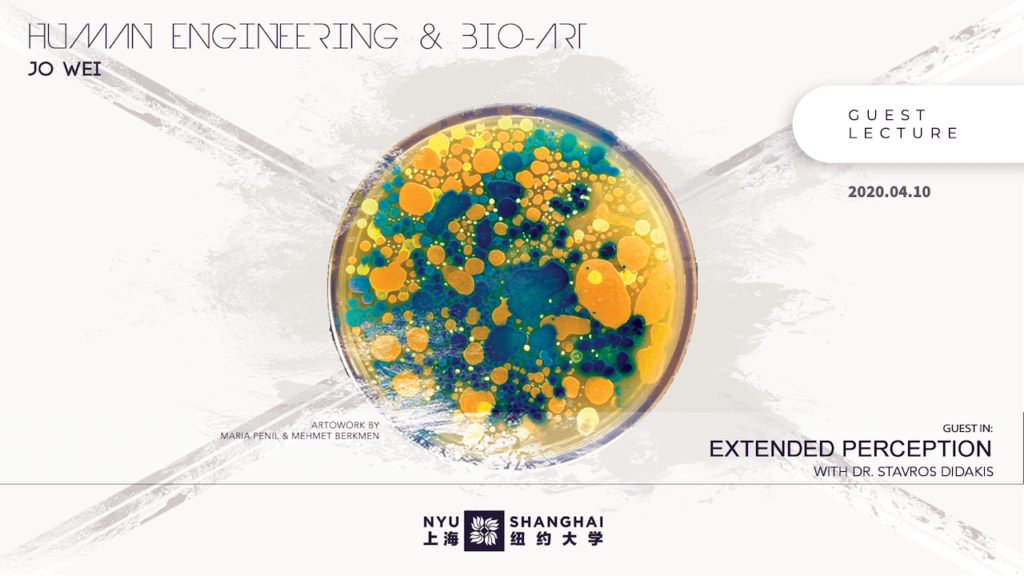
Jonas Joergensen (University of Southern Denmark) – Soft-Robot Aesthetics (guest talk: video recording available here).
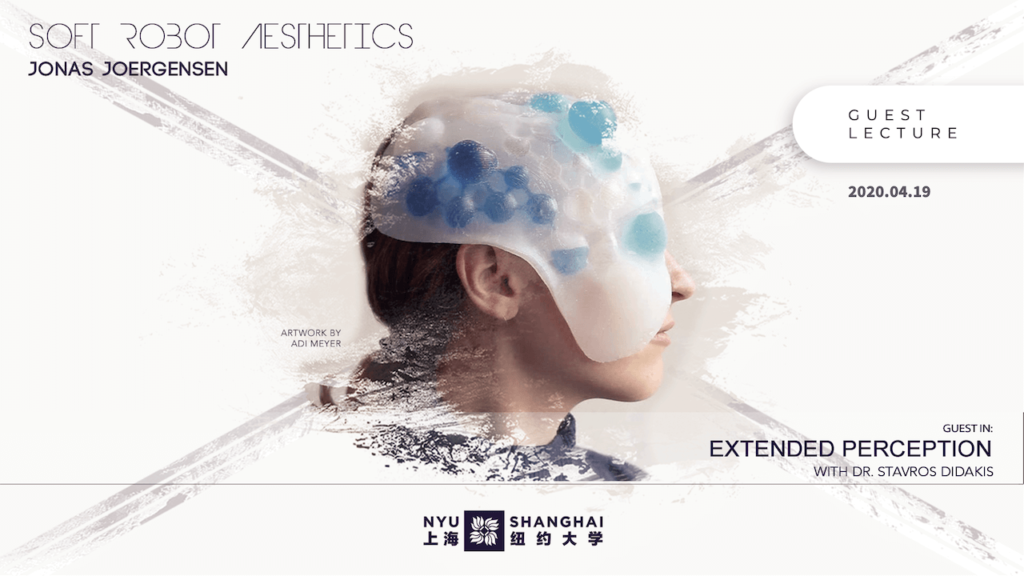
Readings & Resources
Required Textbooks & Materials
- Schwartzman, M. (2011) See Yourself Sensing: Redefining Human Perception, London: Black Dog Publishing.
- Mitchell, W. (2004) ME++ The Cyborg Self and the Networked City, Cambridge Massachusetts: The MIT Press.
Recommended Textbooks & Materials
- Csikszentmihalyi, M. (1994) The Evolving Self: A Psychology for the Third Millenium, New York: HarperColling Publishers Inc.
- Deleuze, G. & Guattari, F. (1987) A Thousand Plateaus, translated by B. Massumi, Minneapolis: University of Minnesota Press.
- Dunne, A. (2005) Hertzian Tales. Electronic Products, Aesthetic Experience, and Critical Design, The MIT Press: Cambridge, MA.
- Goldstein, B. E. (2014) Sensation and Perception, Belmont CA: Wadsworth Cengage Learning.
- Greenfield, A. (2006) Everyware: The Dawning Age of Ubiquitous Computing, New Rivers Publishing: Berkeley, CA.
- Haraway, Donna Jeanne (1991). “A Cyborg Manifesto: Science, Technology, and Socialist-Feminism in the Late Twentieth Century”, in Simians, Cyborgs and Women: The Reinvention of Nature. Routledge.
- Ihde, Don (1990) Technology and the Lifeworld: From Garden to Earth, Bloomington: Indiana University Press.
- Merleau-Ponty, Maurice (1945) Phénoménologie de la Perception, Paris: Gallimard. (Phenomenology of Perception, trans. Colin Smith, London, New York: Taylor & Francis, 2005).
- Schwartzman, M. (2018) See Yourself X, London: Black Dog Publishing.
- von Uexküll, Jacob (1926) Theoretische Biologie, Berlin: J. Springer Verlag. (Theoretical Biology, trans. D. L. Mackinnon, New York: Harcourt, Brace, 1926).
- Embodying the Chimera (chapter from the book “Signs of Life”)
Tutorials
- Arduino Uno Guide
- Arduino Tutorials
- Arduino Beginner’s Guide
- Getting Started with Arduino
- Adafruit Tutorials
Components
Physical Computing Books
- Getting Started with Arduino
- Arduino Cookbook
- Arduino: Step-By-Step Guide To Master Arduino Hardware And Software
- Making Things Talk
- Making Things Move
- Making Things Smart